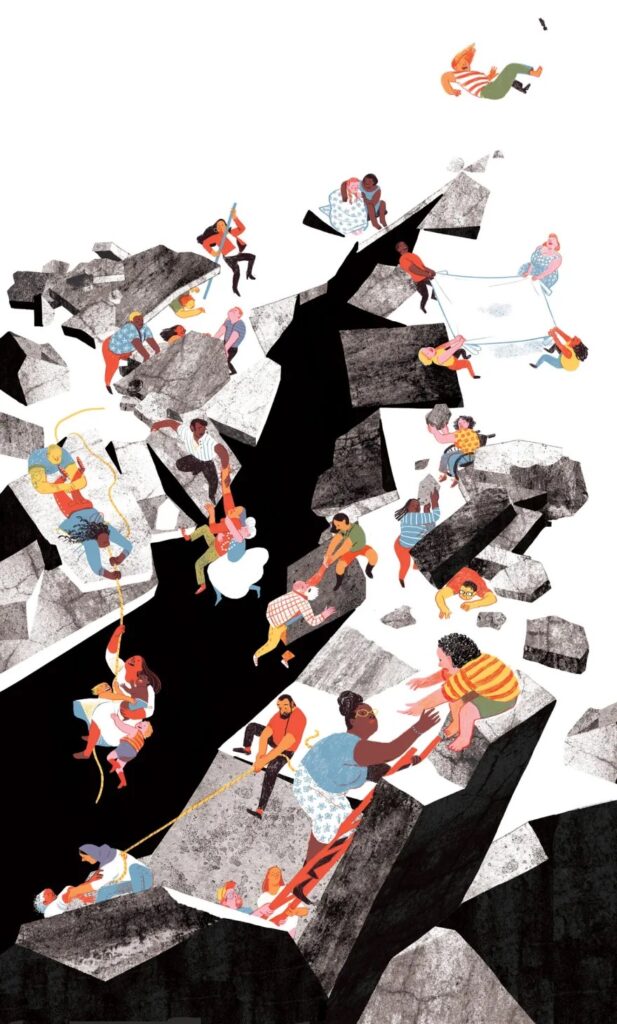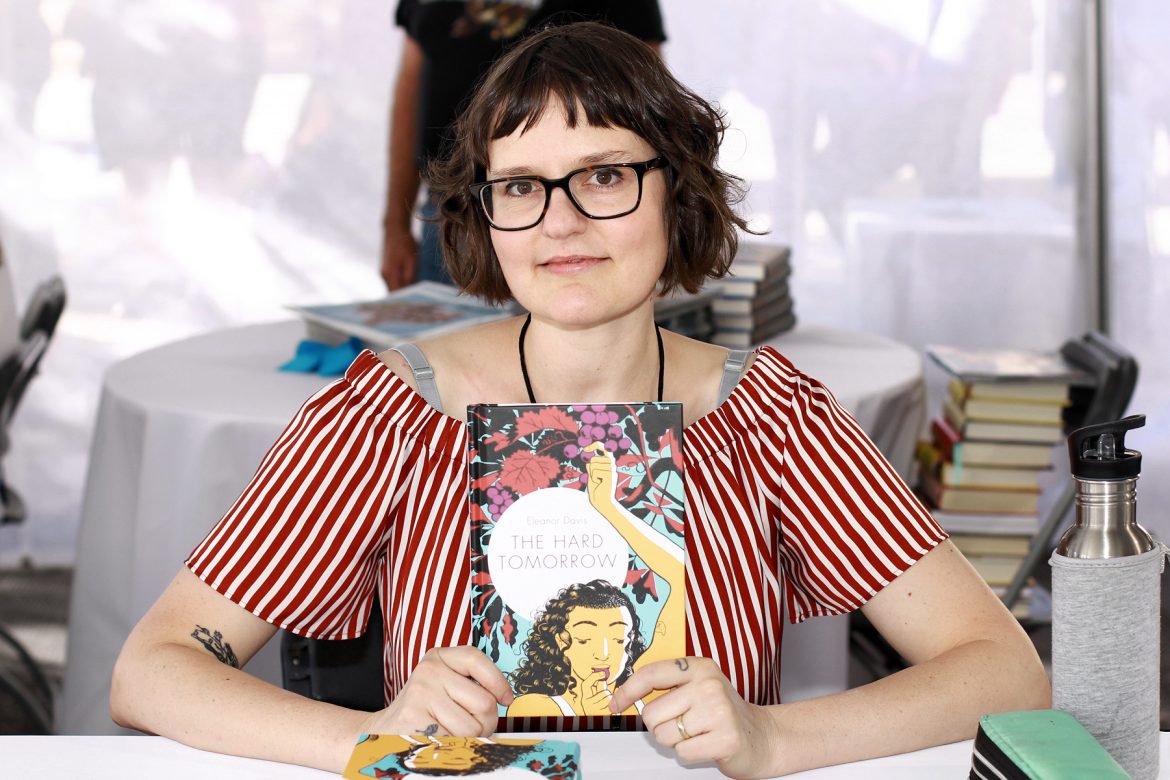Cartoonist and illustrator Eleanor Davis holds a copy of her book, “The Hard Tomorrow.” “The Hard Tomorrow”, the most recent of Davis’s nine books, was released in 2019, and Davis drew inspiration from her own life when creating it. “In the case of “The Hard Tomorrow,” I took a lot of elements of my life and the lives of my friends and I chopped them all up into pieces and I kind of mixed them all up,” Davis said. “So there’s various elements of myself and people I know in the different characters.” Photo courtesy of Eleanor Davis
Variety staffer Isabella Westrich talks with award-winning cartoonist and illustrator Eleanor Davis, an Athens native who currently lives in Arizona, to discuss her accomplishments, inspiration and the meaning of her art.
Variety staffer Isabella Westrich: What can you tell me about your journey with illustrations and cartoons?
Author, cartoonist and illustrator Eleanor Davis: Before (my career) I was just really interested in comics. I had been reading and drawing comics all through my childhood. Then when I hit high school, I found out about zines and mini-comics. At least back in the 90s, they were usually hand-drawn, really focused on kind of (do-it-yourself), scrappy, personal stuff. And that was really inspiring (for me) because a lot of the comics that I read I really loved, but I didn’t have that level of artistic proficiency yet. In zine and mini-comic culture, it’s really more about self-expression. A lot of the products are done in ballpoint pen, stuff like that, and they’re just hand-Xeroxed at Kinkos or (other copy shops). So I started making minis with my best friend. They were making minis first and I guess that’s basically how I found out about (minis), was that they were making mini-comics and had a bunch of mini-comics that they shared with me. And then I started making my own, and decided to go to the Savannah College of Art and Design to major in sequential art, which basically means comics. While I was there, I got more proficient at drawing and decided that I wanted to pursue comics. Even at the time I knew (comics) don’t make a lot of money, especially at that time, the very early 80s. This was before the manga boom so really there weren’t very many Americans making any money off of comics at all. So I decided to try to see if I could do illustration as more of a job while I did comics as my personal work and that’s how it ended up working out.
IW: What are some of your biggest awards or accomplishments?
ED: The last award I won was, I won the LA Book Prize for graphic novels for my book “The Hard Tomorrow”, which came out in 2019 from Drawn and Quarterly. I won three Ignatz awards. The most recent of those was also for “The Hard Tomorrow”.”, I also won for my book “How To Be Happy.”. I’m really proud of the Ignatz awards because they’re kind of a community award that happens at the Small Press Expo, and that’s very important to me because it feels like I’m really being acknowledged by my community. I also won some medals from the Society of Illustrators for an illustration that I’ve done, that was very exciting. This was a piece that I did before, many years ago at this point, in 2010 I think, for the New York Times, and that was really special to me, that’s really what kind of launched my illustration career. I hadn’t really done illustrations before that.
IW: Do you have any projects you’re working on now or any upcoming?
ED: Right now I’m trying to focus on doing single image artworks, that’s kind of where my storytelling is taking me. I’m also doing art for a kids book that I didn’t write, but it’s fun. I keep busy with a lot of newspaper work and odd things like that.
IW: How has the Athens community inspired you or influenced your art?
ED: One of the reasons why we live in Athens is because my husband and I met in Savannah where we both went to art school (at) SCAD, and my husband, Drew Weing, who is also a cartoonist, had met our friend Robert Newsome online. Robert Newsome is one of the cofounders of the FLUKE Mini-Comic Festival. It’s just had its 20th anniversary. We would drive up (to Athens) from Savannah, (Georgia) once a year to come to FLUKE and that was a really important community for us and a really important scene, and we met a lot of friends there. We know a lot of the cartoonists here, and we love them and feel very strongly about them. As far as scenes go, (illustrating) doesn’t have quite the same feeling as the music scene where people come together for concerts and music events and performances, because comic (artists) are usually drawing alone in their studios. So that’s one of the reasons why FLUKE is so important, because it’s one of the few times where we all come together at once.
IW: Where does the inspiration for your pieces come from?
ED: My stuff is primarily autobiographical in that I try my best both in my art and in my life to keep a wide circle of empathy and understand as many people as possible, but I’m not going to be writing stuff about people I don’t know anything about or understand at all. I tend to try to use fiction to write the truest possible story about the life I’ve actually known when it’s not straight-up autobiographical. In the case of “The Hard Tomorrow” I took a lot of elements of my life and the lives of my friends and I chopped them all up into pieces and I kind of mixed them all up. So there’s various elements of myself and people I know in the different characters.

“Earthquake: When things fall apart, people come together” by Eleanor Davis is shown. This illustration appeared in a March 12 2020 New York Times article, one of the many illustrations Davis has done for notable organizations and publications. “Every illustration feels like a little puzzle and it’s fun to figure out and solve the puzzles,” Davis said. Photo courtesy of doing-fine.com
IW: Once you have your idea and you’re working on the piece, what’s your process from there?
ED: With comics, most of the time, my initial stages are relatively time-consuming. I usually do a bunch of rough versions of what I want the final pages to look like. I think with “The Hard Tomorrow” I went through like 10 different drafts where I was editing and editing and changing and moving stuff around. My husband read it dozens of times, I re-read it 100 times. Because once you get into the final art, it’s really hard to edit. Comics are super hard to edit because anytime you want to add a panel or take out a panel, it’s like a whole house of cards, where you get your pages all out of order, they scoot panels around. So I try to get things pretty tight before I go to the final print.
IW: What does art mean to you? Why do you do it?
ED: I always felt kind of ambivalent about art, like that I really ought to be doing something else or something more useful, something more important. As I’ve gotten older, I’ve gotten a little bit more comfortable with the idea that this is really the only thing I’m very good at, so I might as well, and it’s what I enjoy. I like having a lot of alone time. I like being in my studio, working things out. Illustrations in particular – every illustration feels like a little puzzle and it’s fun to figure out and solve the puzzles. The rhythm of my workday is one that I enjoy. And in general, I know that this isn’t the case for a lot of artists, but for me, art is definitely kind of the way that I figure out what’s going on in my own life. I have a lot of messy thoughts in my head, and getting them out on paper in a story often feels helpful and therapeutic in some way.
IW: What do you think your art means to other people? Why is it important to them?
ED: I’m not so sure anymore. For a while, it was mostly kind of inward-looking, and I think that is still the case, probably. A lot of people feel pretty lonely, they feel pretty isolated. And I think a large part of our experience in responding to art, not the only one but for many folks a very powerful one, is to, when you see something that expresses a feeling that you’ve had or that you share, seeing someone else express it makes you feel connected to them in some way, or less alone or in some ways seen. It can sometimes even help something click inside you that maybe you haven’t been able to figure out or have been working on. Yeah, so definitely a primarily therapeutic sort of connection.
IW: What do you want people to take away from your work?
ED: There’s just so much content now, and we’re being inundated with so many images, and so many stories and so much stuff. And I find myself scrolling through Instagram or whatever looking at art, even if it’s really good art, I mostly feel kind of stressed out and bored, even when the art is good and even when I like it, it just feels like more noise. But still, there are some artists, cartoonists– the ones that really stick out in my mind right now that do this are Warren Weinstein, Tyler Roberts and Laura Dennis. And there are a lot more, but those ones do it for me every time in a pretty astonishing way. Like whenever I see their stuff, it doesn’t just feel like more noise. It feels exciting and fresh and enriching rather than just overwhelming. (For my work to do that) would be amazing.
